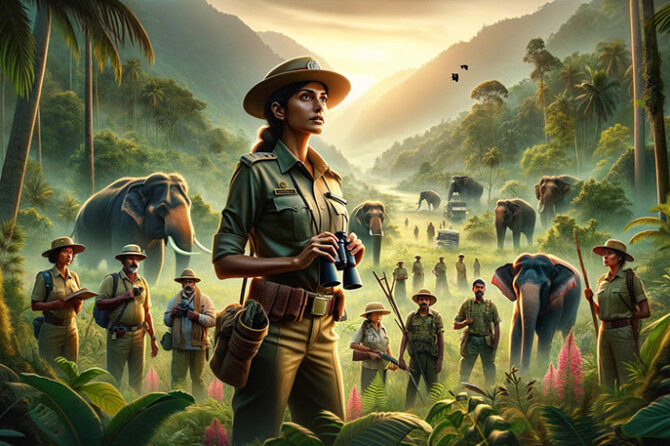
As I settled into the heart of Kerala’s lush greenery through the lens of Richie Mehta’s web series “Poacher,” on Amazon Prime Video, I found myself transported. The tranquility of the jungle, with its freely roaming elephants, belied the brutal reality of poaching that awaited. This series, inspired by true events, became more than just a watch; it was an emotional expedition that challenged my perceptions of wildlife conservation and the human spirit’s resilience.
In the shadows of this serene landscape, a heartless hunter targets an elephant, igniting a narrative that exposes the dark underbelly of ivory smuggling. The crime, though severe, is only a piece of a vast poaching syndicate that spans national and international borders, catering to collectors who see ivory as a symbol of luxury, inadvertently funding terrorism.
What struck me most was the indifference of the urban populace to this plight. A Delhi cop’s dismissive attitude towards wildlife conservation highlighted a widespread lack of concern, juxtaposed against a team of forest officers’ unwavering determination. This contrast became the crux of my introspection. The journey of Mala Jogi, Alan Joseph, and Neel Banerjee, as they navigated through Kerala, Goa, and Delhi, was not just about combating poaching. It was a testament to the human spirit’s capacity to fight for justice, irrespective of the personal costs.
Mala’s battle against her past, Alan’s struggle to balance his passion with his familial responsibilities, and Neel’s relentless pursuit of justice, despite personal health challenges, showcased the complexities of those who dedicate their lives to conservation. The personal sacrifices they made, the emotional toll it took, and their undying commitment moved me profoundly.
“Poacher” is more than a narrative about wildlife conservation; it’s a reflection on human values, ethics, and the choices we make. The series, through its tense and thrilling episodes, delves into the intricate texture of personal and professional quandaries faced by its protagonists. Their stories of vulnerability, rage, empathy, and resilience offer precious insights into the complexity of human nature.
The series doesn’t shy away from depicting the dark realities of poaching, including the lazy patrolling and negligence by some forest rangers and the red tape that hampers justice. Yet, it also finds moments of beauty and introspection, allowing viewers to ponder the irony of how poachers know the forest more intimately than conservationists, but with vastly different intents.

The cinematography and background score add layers to the storytelling, creating an immersive experience that’s both enlightening and heart-wrenching. “Poacher” serves as a poignant reminder of the ecosystem’s fragile balance and the urgent need to preserve it.
Reflecting on “Poacher,” I’m left with a mix of emotions. The series not only entertains but also educates and inspires. It’s a call to action for all of us to reconsider our relationship with nature and our role in its preservation. The narrative, with its vivid characters and compelling storyline, motivates us to think beyond our immediate surroundings and contribute to causes that ensure the survival of our planet’s precious wildlife.
“Poacher” is a reminder that change is possible when individuals, driven by passion and determination, come together to fight against the odds. It’s a testament to the power of storytelling in motivating us to take a stand for what we believe in, to fight for justice, and to protect the vulnerable. As I journeyed through the episodes, I found myself more than just a spectator; I felt like a participant in a cause much greater than myself.
This series, with its intricate blend of thrills and thought-provoking moments, is a must-watch for anyone looking for a story that inspires action. “Poacher” is not just a critique of wildlife crime; it’s a celebration of the human spirit’s capacity to enact change. It challenges us to look within and ask if we’re doing enough to protect the natural world that sustains us. In the end, “Poacher” leaves us with a crucial question: Will greedy humans ever understand the importance of leaving nature alone, or will we continue to be the architects of our own downfall?
As I reflect on the powerful message of “Poacher,” I’m motivated to take action in my own life, to advocate for wildlife conservation, and to support those who put everything on the line for the sake of our planet. This series has not only enlightened me but also inspired me to believe in the power of collective action. Let us be the change we wish to see, for the sake of our planet and future generations.
Prof. Dr. Prahlada N. B
25 February 2024
Chitradurga.

















Prahlada Sir 💐✨,
Powerful message has been reflected by you on wildlife conservation very nicely in this blog, based on the Richie Mehta's web series documentary : POACHER ; Thanks for same.
Here are some measures which may help in the battle against poaching :
*Preserve and restore natural habitats by implementing conservation programs, creating protected areas, and preventing deforestation. This will provide a safe environment for wildlife to thrive.
*Implement sustainable hunting practices and regulate hunting quotas to prevent overhunting and maintain balance in ecosystems.
*Increase public awareness about the importance of wildlife conservation through educational programs, documentaries, and social media campaigns.
*Strengthen laws against poaching and wildlife trafficking, and enforce strict penalties for offenders*
*Involve local communities in conservation efforts and provide them with alternative sources of income that do not harm wildlife, such as ecotourism, sustainable agriculture and handicrafts.
*Conduct regular research on wildlife populations and their habitats to identify threats and implement targeted conservation strategies.
*Reduce greenhouse gas emissions and promote sustainable practices to mitigate the effects of climate change, which can severely impact wildlife and their habitats.
*Work with governments, non-governmental organizations and private sectors to pool resource and expertise for effective wildlife conservation efforts.
*Promote responsible wildlife tourism that benefits local communities and conserves natural habitats, while educating tourists about the importance of preserving wildlife and their environments.🐘🐅🦓🙇♂️✨
Reply